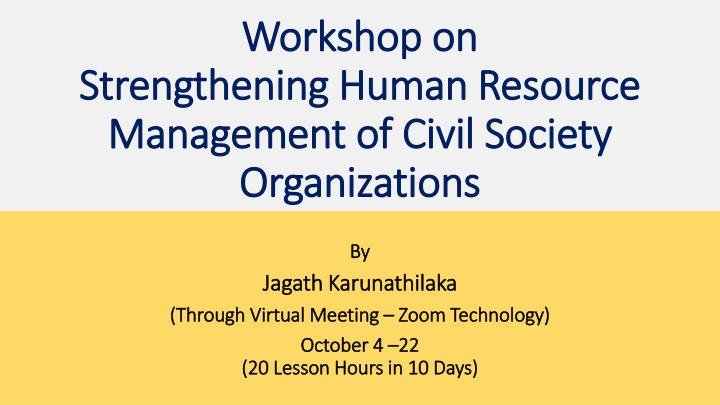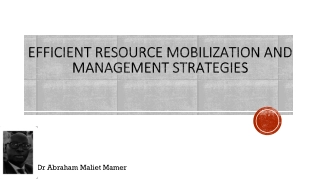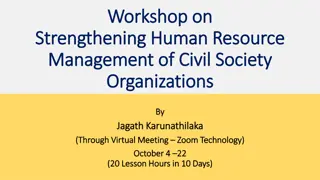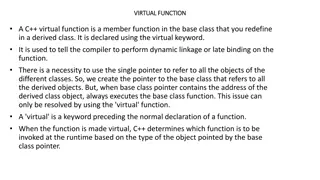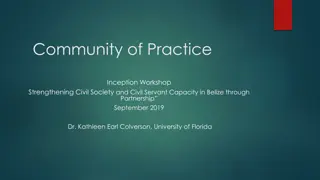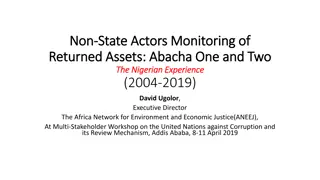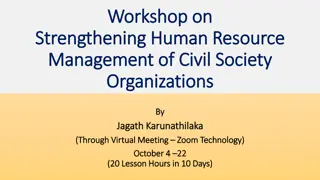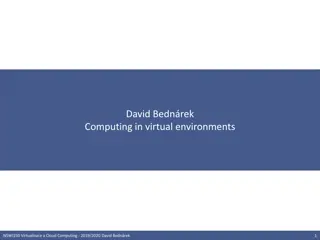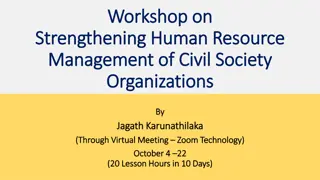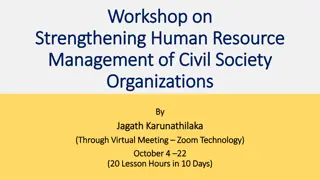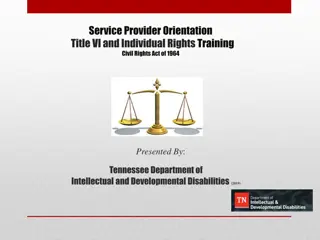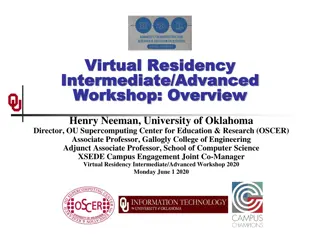Virtual Workshop: Strengthening Human Resource Management of Civil Society Organizations
"Join Jagath Karunathilaka in a virtual workshop focusing on various aspects of human resource management for civil society organizations. Learn about business code practices, recruitment processes, rewards and recognition, conflict management, and more. Explore topics like superannuation and severance, essential for legal compliance and employee welfare. Enhance your HR knowledge and practices to support the growth and effectiveness of your organization."
Download Presentation

Please find below an Image/Link to download the presentation.
The content on the website is provided AS IS for your information and personal use only. It may not be sold, licensed, or shared on other websites without obtaining consent from the author.If you encounter any issues during the download, it is possible that the publisher has removed the file from their server.
You are allowed to download the files provided on this website for personal or commercial use, subject to the condition that they are used lawfully. All files are the property of their respective owners.
The content on the website is provided AS IS for your information and personal use only. It may not be sold, licensed, or shared on other websites without obtaining consent from the author.
E N D
Presentation Transcript
Workshop on Workshop on Strengthening Human Resource Strengthening Human Resource Management of Civil Society Management of Civil Society Organizations Organizations By By Jagath Jagath Karunathilaka Karunathilaka (Through Virtual Meeting (Through Virtual Meeting Zoom Technology) October 4 October 4 22 22 (20 Lesson Hours in 10 Days) (20 Lesson Hours in 10 Days) Zoom Technology)
Lesson Plans of HR Management of CSO Lesson Plans of HR Management of CSO Chapter No Lesson Topics Scheduled Date Timing Monday, 4th October 1 Business Code Practice, Compliance and Data Security Employment Practices 10.00 12.00am 2 Tuesday, 5th October 3 Recruitment, Selection and Induction 10.00 11.30am Wednesday, 6th October 4 General Terms and Conditions of Employment 10.00 12.00am Thursday, 7th October 5 Rewards and Recognition 10.00 11.30am Monday, 11th October 6 Performance Review, Training & Learning Practices Superannuation and Severance 9.00 12.00am Tuesday, 12th October 7 10.00 11.30am Wednesday, 13th October Thursday, 14th October 8 Conflict and Grievance Management 10.00 11.30am 9 Disciplinary Management 9.00 12.00am Thursday, 21st October 10 Employment Law & Employee Rights 10.00 12.00am Friday, 22nd October 11 Current Issues & Trends in HRM 10.00 11.30am
Chapter 7: Superannuation and Severance Chapter 7: Superannuation and Severance About This Chapter About This Chapter The superannuation and severance chapter of this workshop is designed you to learn about superannuation that refers to retirement you take after you have reached a predetermined age or terminal benefits of an employment in compliance with the legal provision and also learn about severance that is lay off of an employment by written notice or by mutual agreement or termination on disciplinary background or a reason relating to the business decision like merger, acquisition or closing dawn an entity due to various reasons The guidance and the tools introduced through this chapter can help you to set up, revise or realign existing superannuation and severance practices in meeting the legal and other requirements.
Superannuation: Superannuation: Providing terminal benefits within the legal provision Employees Provident Fund Employees Trust Fund Payment Of Gratuity Or Pension Severances practices Severances practices Retirement Volunteer resignation Vacation of employment Medical condemnation Dismissal on disciplinary grounds Expiration of the contract period Redundancy of the service contract Conduct exist interviews Terminal dues and benefits and clearance on severance
Superannuation Superannuation Employees Provident Fund Employees Provident Fund The Employees Provident Fund Act 15 of 1958 applies to all workers and lays down rules for contribution by employers and workers and other administrative rules. All employees are covered by the Employees Provident Fund (EPF). This is payable in respect of all employees whether casual or otherwise. The Company will contribute twelve percent (12%) of the salary/wage of an employee and the employees should contribute a minimum of eight percent (8%) of their salary/wage.
Superannuation Superannuation Employees Trust Fund Employees Trust Fund Employer s contribution towards ETF is three percent (3%) based on the total earnings as described above.
Superannuation Superannuation Employees Trust Fund Employees Trust Fund The ETF Board was established under Act No-46 of 1980 and commenced operations on 1st March 1981 under the Ministry of Labour. All public sector employees who are not entitled to the Govt. Pension Scheme and all private sector employees are members of this Fund while their employers are required to remit 3% of the gross earnings of their employees to the Fund, monthly. Hence, unlike the EPF, only the employer makes a contribution on behalf of the employee/member and hence, it is a non-contributory benefit to the member.
Member Benefits ETF A main objective of establishing the Fund was to provide non- contributory welfare benefits to its members while at present the following 08 schemes are in operation. These benefits are granted irrespective of the balance in the members account and also no deductions are made from their accounts for the benefits paid while the members account is credited with the full interest and dividend declared by the Fund each year. Benefits scheme Value Death Benefits Rs. 100,000/- Permanent Disable Rs. 200,000/- Intraocular lens (IOL) Rs. 15,000 each eye Heart Surgery Assistance Rs. 300,000/- Kidney Transplant Assistance Rs. 300,000/- SHRAMASUWA REKAWARANA Hospitalization Scheme Rs. 50,000/= Rs.15,000/- each for 9000 Scholarships per year. Rs.12,000/- each for 5000, Financial grants per year. Rs, 100,000 Up to Rs. 2,500,000 at concessionary rates of interest Year-05 Scholarships GCE(AL) Examination "VIYANA" Housing loan Scheme.
Superannuation Superannuation Gratuity Gratuity As per the Gratuity Law an employee is entitled, on completion of five (05) years service, to a payment of half ( ) month s salary for each year of completed service. The salary for this purpose is the terminal salary (last drawn salary). Salary or wage means, gross wage or salary with all other allowances, entitled contributing to the Employees Provident Fund. The gratuity is payable within thirty (30) days of termination of employment.
Superannuation Superannuation Gratuity Gratuity According to the Payment of Gratuity Act No.12 of 1983, the eligibility requirements for gratuity claims are as follows: 1. The particular employee should have been employed in an institution where employing 15 or more employees during the period of 12 months preceding the date of terminating or terminated the employment of the employee. 2. Completion of at least 5 years of continuous service by the employee. 3. You do not need to complete an application form to receive gratuity payment. The employer must pay the gratuity payment within one month from the date you resign from the organization. In the event of death of an employee, the gratuity is to be paid to the employee s family. 4. In case of default of gratuity payment by the employer, a complaint should be lodged to the Labor Department.
Superannuation Superannuation Gratuity Gratuity In case of delay in payment of gratuity by the employer, the surcharge In case of delay in payment of gratuity by the employer, the surcharge will be applicable as follows: will be applicable as follows: Payment in arrears for not more than 1 month =10% Payment in arrears for 1 month to 3 months =15% Payment in arrears for 3 months to 6 months =20% Payment in arrears for 6 months to 12 months =25% Payment in arrears for more than 12 months =30%
Superannuation Superannuation Gratuity Gratuity How to calculate Gratuity? (Basic Salary /2) No. of years of employment Example: Suppose Kumar joined his former employer on September 24, 2014. He resigned from his job on March 15, 2020. Let s see the final payment for Kumar. His last basic salary was Rs. 50,000 per month. Number of years Kumar has worked: (15, March 2020 - 24th, Sep 2014) ~ 5 years, 5 months+ Number of years eligible for gratuity payment: 5 Final Payment = (50,000 /2) * 5 = Rs. 125,000/=
Severance Severance Retirement Retirement The age of retirement in the company is 55 years which will be set out in the Letter of Appointment of each employee. The date of birth given at the commencement of employment, substantiated by the Birth Certificate and/or National Identity Card will be taken as conclusive evidence of same.
Severance Severance Volunteer Resignation Volunteer Resignation All permanent employees should give the stipulated notice as per their appointment letters of their intention to leave employment or pay stipulated period of salary in lieu of such notice. The management could similarly give notice and pay a related period of salary and terminate the services of an employee for valid reasons other than for termination on disciplinary grounds.
Severance Severance Volunteer Resignation Volunteer Resignation If the management refuses to accept her/his resignation on disciplinary grounds and the employee ceases to report for duty, she/he should be deemed to have vacated her/his post as from the date of such cessation. The resigning employee is subject to an exit interview carried out by the HR division to determine feedback on the company operations and its management (See Template for Exit Interview).
Severance Severance Volunteer Resignation Volunteer Resignation Acceptance of the resignation should be notified to the employee concerned in writing with copies to the relevant divisional heads by the HR division of the company. At the end of the service, a certificate relating to the tenure at the company may be issued on the request of an employee.
Severance Severance Vacation of Employment Vacation of Employment Absence without any intimation for 2 days will render the employee to be treated as having vacated post if the employee is found unable to furnish satisfactory reasons for his absence and failure to intimate. If an employee is absent for 2 days and above without approved leave or formal communication will deem to have vacated her/his post from the date of such absence.
Severance Severance Vacation of Employment Vacation of Employment The ED/CEO or the delegated authority shall serve such an employee with a vacation of post notice by registered post or by personal delivery. If the employee does not submit an appeal within two weeks, the vacation of post shall be converted to a dismissal. If the employee submits an appeal to the ED/CEO or the delegated authority within two weeks from the date of receipt of such notice, it may be considered to permit the employee to resume duties.
Severance Severance Medical Condemnation Medical Condemnation In the event an employee is unable to continue employment due to ill-health, the management will request the employee concerned to undergo a medical examination to be carried out by a doctor/specialist nominated by the company. On completion of the medical examination, if the employee is found to be medically unfit for employment, the management will medically condemn the employee.
Severance Severance Termination of Employment Termination of Employment The company reserves the right to terminate an employee at any time without notice or payment in lieu of such notice on the grounds of misconduct and/or, gross negligence, improper performance of duties, acts of moral turpitude, acts subversive of discipline both within and outside the place of employment affecting the credibility and the future of the business of the company and/or its goodwill and/or breach of any express of implied terms of the contract of employment, more fully set out in the code of conduct/standing orders of the company.
Severance Severance Termination of Employment Termination of Employment All lapses acts of misconduct, frauds, neglect of duty, indiscipline, discourtesy, insubordination, general inefficiency, and contravention of any official instructions or directions already issued or that may be issued from time to time can therefore be dealt with disciplinary powers conferred on the company The company further reserves the right to terminate an employment due to re-organization, closure and retrenchment arising from economic reasons, re-organizational exigencies and other factors beyond the control of the company and/or for any acts physical impossibility preventing the performance of this contract.
Severance Severance Termination of Employment Termination of Employment In regard to above, where the prevailing law requires and form of notice or prior permission to terminate from the employment, the company will terminate the service in compliance with such law. The power to dismiss its employee is vested to ED/CEO or Board of Directors in terms of the disciplinary rule of the company
Severance Severance Expiration of the Contract Period Expiration of the Contract Period Employee engaged in a fixed term of appointment on contract basis shall expire on the date of completing contractual period, however, where necessary on exigencies of the service, company may extend the service contract for a further period of time.
Severance Severance Redundancy of the Service Contract Redundancy of the Service Contract Service contract may expire in the event of death of employee, sick or jailed in longer time who is unable to carry out the service contract physically. In the event of the death while in the service of an employee, who has at least completed one year of service, a compensation shall be paid to the surviving spouse or dependent children as decided by the ED/CEO on the approval of the Board Directors.
Severance Severance Terminal Dues and Benefits Terminal Dues and Benefits On termination of employment the employee will be eligible for the following terminal benefits; Employees Provident Fund (EPF) Employees Trust Fund (ETF) Gratuity
Severance Severance Clearance on Severance Clearance on Severance Upon termination of services, the head of the division and the HR division will prepare the clearance certificate to be issued to the employee in respect of the company property in his/her possession at the time of termination. Any property lost, damaged or not returned will be recorded accordingly and the employee concerned will be required to settle all such losses and damages, before the release of the final dues after receipt of the clearance certificate.
